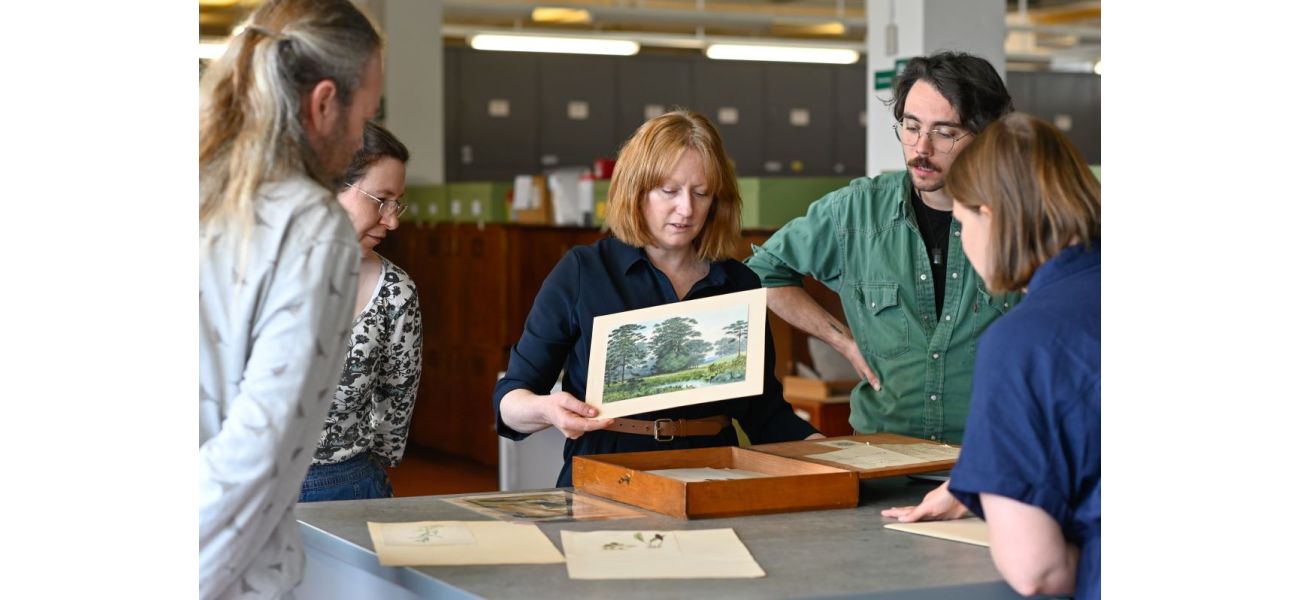Protecting plants at Royal Botanic Garden Edinburgh is urgent due to climate change.
Professor Olwen Grace discusses digitizing specimens collected by Charles Darwin and the urgency of conserving plants due to climate change.
November 26th 2024.

As a child growing up in South Africa, I was surrounded by nature and spent my days riding horses and learning about plants and wildlife. Both of my parents were scientists, so it was no surprise that I followed in their footsteps. In 2023, I joined the Royal Botanic Garden Edinburgh, where I now work with collections from botanic gardens and museums, while also studying the evolution of succulent plants. My love for plants has only grown, and I find great joy in connecting people to our botanical collections.
A typical day for me begins with a cup of coffee and updates from my team and students on their research and curation projects. Then, I head into meetings to discuss various projects. On days dedicated to research, I spend most of my time in front of the computer, but I always make sure to take a walk in the garden to clear my mind and gather my thoughts. Before the day ends, I catch up on correspondence and plan for the next day's tasks. Then, I head off to pick up my son from school.
The world of plants and fungi is essential for our existence, and it is my responsibility to care for these collections as they are the heritage of future generations. We are constantly finding new and innovative ways to use these specimens, from estimating the tree of life using DNA from dried herbarium specimens to future uses that we cannot even imagine yet. The Herbarium at RBGE represents three centuries of plant collecting from all over the world, including species that are on the verge of extinction.
While it is awe-inspiring to work with specimens collected by famous biologists like Charles Darwin and Alfred Russel Wallace, I find it even more exciting to come across a specimen that has never been seen before by science. We have an extensive collection made by our own scientists, such as Dr. David Harris, whose work in tropical Africa has helped map previously unknown forest ecosystems.
One of the most challenging aspects of my job is seeing the loss of biodiversity and the impact it has on people's lives, including my colleagues who are deeply passionate about preserving our natural environment. That's why we make sure to use our specimens in every way possible, even using some as seed sources to prevent species from going extinct. For example, we have a specimen of Calceolaria valdiviana collected in 1903 that became a "seed donor" in 2008, successfully increasing the genetic diversity of the species in botanic gardens. Each specimen tells its own unique story.
Recently, I had the opportunity to take part in the digitization of the one millionth specimen in the Herbarium. I chose a lichen collected by our scientist Dr. Rebecca Yahr on Ben Nevis. Its genome will be sequenced for the Darwin Tree of Life project, which aims to sequence the genomes of all 72,000 plants, animals, fungi, and other living organisms in the UK and Ireland. It was a tough decision to make, given the incredible diversity of our botanical collections at RBGE.
One of the most rewarding parts of my job is being able to make a positive impact on the world. I am determined to continue finding new ways to work efficiently so that we can preserve plant biodiversity not only in Scotland but throughout the world. With climate change, we are racing against the clock to describe and conserve plants, and it is vital that we have a toolkit for resilience in the future.
After work, I turn my attention to my home life. I am grateful to have the opportunity to connect with nature and get some exercise every day, which helps me unwind before returning to my home in north Edinburgh. You can read more about my work in the Life With series and subscribe to the latest issue of Scottish Field.
A typical day for me begins with a cup of coffee and updates from my team and students on their research and curation projects. Then, I head into meetings to discuss various projects. On days dedicated to research, I spend most of my time in front of the computer, but I always make sure to take a walk in the garden to clear my mind and gather my thoughts. Before the day ends, I catch up on correspondence and plan for the next day's tasks. Then, I head off to pick up my son from school.
The world of plants and fungi is essential for our existence, and it is my responsibility to care for these collections as they are the heritage of future generations. We are constantly finding new and innovative ways to use these specimens, from estimating the tree of life using DNA from dried herbarium specimens to future uses that we cannot even imagine yet. The Herbarium at RBGE represents three centuries of plant collecting from all over the world, including species that are on the verge of extinction.
While it is awe-inspiring to work with specimens collected by famous biologists like Charles Darwin and Alfred Russel Wallace, I find it even more exciting to come across a specimen that has never been seen before by science. We have an extensive collection made by our own scientists, such as Dr. David Harris, whose work in tropical Africa has helped map previously unknown forest ecosystems.
One of the most challenging aspects of my job is seeing the loss of biodiversity and the impact it has on people's lives, including my colleagues who are deeply passionate about preserving our natural environment. That's why we make sure to use our specimens in every way possible, even using some as seed sources to prevent species from going extinct. For example, we have a specimen of Calceolaria valdiviana collected in 1903 that became a "seed donor" in 2008, successfully increasing the genetic diversity of the species in botanic gardens. Each specimen tells its own unique story.
Recently, I had the opportunity to take part in the digitization of the one millionth specimen in the Herbarium. I chose a lichen collected by our scientist Dr. Rebecca Yahr on Ben Nevis. Its genome will be sequenced for the Darwin Tree of Life project, which aims to sequence the genomes of all 72,000 plants, animals, fungi, and other living organisms in the UK and Ireland. It was a tough decision to make, given the incredible diversity of our botanical collections at RBGE.
One of the most rewarding parts of my job is being able to make a positive impact on the world. I am determined to continue finding new ways to work efficiently so that we can preserve plant biodiversity not only in Scotland but throughout the world. With climate change, we are racing against the clock to describe and conserve plants, and it is vital that we have a toolkit for resilience in the future.
After work, I turn my attention to my home life. I am grateful to have the opportunity to connect with nature and get some exercise every day, which helps me unwind before returning to my home in north Edinburgh. You can read more about my work in the Life With series and subscribe to the latest issue of Scottish Field.
[This article has been trending online recently and has been generated with AI. Your feed is customized.]
[Generative AI is experimental.]
0
0
Submit Comment





